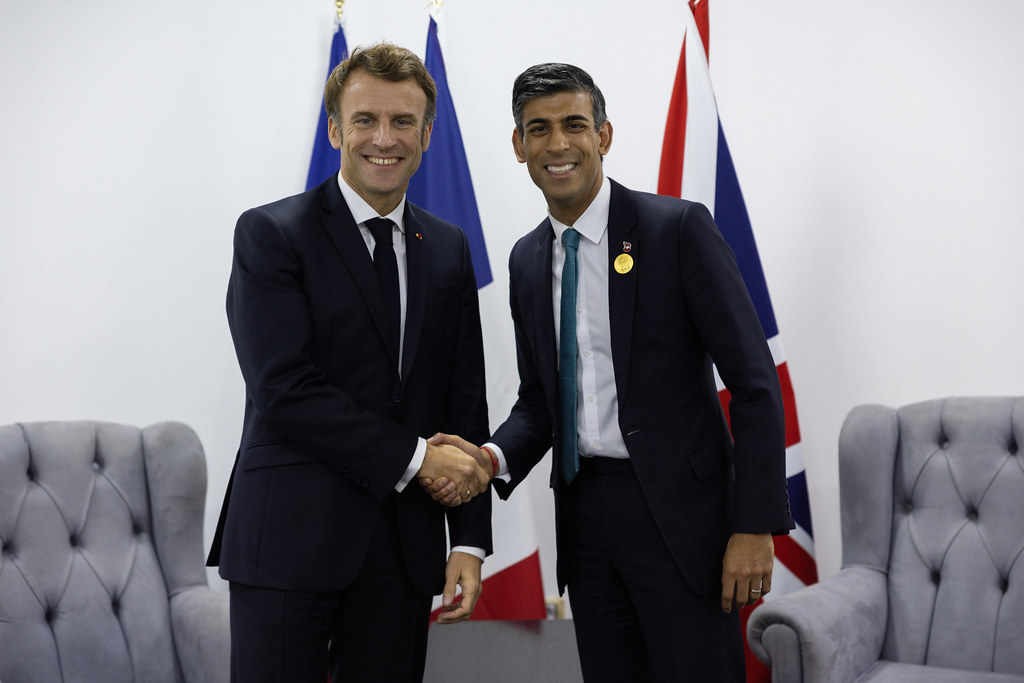10 MARCH 2023 | NEWS
In a joint press conference today, UK Prime Minister Rishi Sunak and French President Emmanuel Macron announced a new agreement to curb the arrival of illegal migrants to the UK from France.
Per the agreement, the UK will spend £479 million over three years to fund a new migrant detention centre in France, with the Prime Minister stressing that this is “going to make a difference”. However, the agreement will not involve the possibility of returning migrants to France, where they originally sailed from.
On this matter, the French President was unequivocal when he said: “The Dublin Agreement can’t be implemented anymore.” This refers to a matter of EU law that specifies which country is responsible for assessing the application of a migrant claiming asylum – nominally, the first safe EU country they arrive in.
It does, however, involve funding for additional police patrols to track down migrants seeking to sail from the beaches, before they are able to leave. The number of people making the dangerous crossing was more than 45,000 last year, compared to only around 300 as recently as 2018.
The new agreement is intended to reinforce the deterrant factor for both would-be migrants and their traffickers, while also seeking to calm tensions that have existed between the UK and France on the matter for several years. The Prime Minister referred to the “shared challenges” and “joint efforts” that would be needed to resolve it, adding that it would not be “resolved overnight”.
It is not yet clear how the new detention centre will function. However, the press conference did reveal a thawing of relations on the world stage. President Macron said the two nations, “bound by history and geography”, would now seek to “make progress in lockstep” on illegal immigration.
He implied that Brexit had been a factor in resolving the matter, adding that: “It makes sense with our history, our geography – we want the best possible, closest alliance … It will depend on our commitment, our willingness. But I am sure we will do it.”
The Prime Minister ended with an upbeat tone, saying: “We left the EU, but we didn’t leave Europe.” The two world leaders then embraced as the press conference concluded.
France’s Minister for the Economy, Bruno Le Mair – who was also present at the summit – hailed the beginning of a new relationship between the two nations, saying: “The atmosphere today was a very good one and a very friendly one. This summit is the beginning of a new entente between France and the UK.”
Mr Le Mair is understood to be a long-time acquaintance of Mr Sunak, having worked with him on sanctions against Russia while the present Prime Minister was still Chancellor of the Exchequer. Mr Sunak also described today’s agreement in similar terms – as a “new chapter”.
But the Labour Party responded to the developments by criticising the Government for “making the same old mistakes, all while doing nothing to tackle the root causes of this crisis”.
Shadow Attorney General Emily Thornberry said: “Before Rishi Sunak sends even more money to the French authorities to tackle this crisis, he needs to explain what was achieved by the hundreds of millions we’ve given them before, and why small boat crossings continued to go up regardless.”
The Opposition has encouraged the Government to consider its own five-point plan for bringing a halt to illegal Channel crossings, which includes tougher enforcement action against criminal gangs, faster decision on asylum claims, reform of resettlement schemes, a new treaty to replace the Dublin Agreement and working at an international level to tackle the root causes of people making the decision to migrate.
The British Red Cross has also said that today’s agreement is “disappointing”, adding that the recently-introduced Illegal Migration Bill would be “ineffective, hugely expensive, and remain contrary to the international laws our country was once proud to have shaped”.
The charity’s Executive Director, Christina Marriott, said: “The Government should focus its efforts on addressing the real problems with the system – like inefficiencies that have resulted in a backlog of 160,000 people waiting for a decision on their claim.”
And Jon Sparkes, the Chief Executive for the UK Committee of UN charity Unicef said it was also “deeply concerned”, adding in a statement: “This Bill puts children’s right to safety and protection under threat by denying children who arrive through irregular routes, such as on a boat across the English Channel, from making an asylum claim, and with that the chance to rebuild their lives with stability and certainty here in the UK.
“The Bill has been published without an accompanying assessment of its impact on children, leaving many critical questions unanswered.”
But the UK and French Governments both appear determined to deliver on the new arrangements. In a statement issued today, the UK Government said: “Hundreds of extra French law enforcement officers will use enhanced technology and intelligence insight to prevent illegal Channel crossings under a new agreement struck by the Prime Minister and President Macron in Paris today.
“Efforts will be bolstered by a new, highly-trained, permanent French mobile policing unit dedicated to tackling small boats. Additional drones, aircraft and other technologies like surveillance will also be deployed, as the UK and France step up intelligence-sharing to clamp down on people-trafficking routes.”
Both Governments have yet to make any further announcements as to how and when the new arrangements will take effect.

























